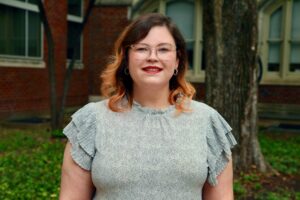Written by Katherine Ankenbauer, Ph.D.
 Curiosity has always gotten the better of me. As a child, my curiosity had to be quite a difficult quality as I was always getting into SOMETHING. At home? It was my mother’s bathroom cabinet where I proceeded to put lotion in my hair, thinking it was mousse. At school? Instead of taking a nap, I would always sneak around opening cabinets to see what was inside. I guess it came as no surprise that I became a scientist as I always wanted to explore, learn new things, and discover the answers to my many, MANY questions.
Curiosity has always gotten the better of me. As a child, my curiosity had to be quite a difficult quality as I was always getting into SOMETHING. At home? It was my mother’s bathroom cabinet where I proceeded to put lotion in my hair, thinking it was mousse. At school? Instead of taking a nap, I would always sneak around opening cabinets to see what was inside. I guess it came as no surprise that I became a scientist as I always wanted to explore, learn new things, and discover the answers to my many, MANY questions.
It just so happened that many of the questions I had growing up had to do with cancer. What exactly is cancer? How does cancer form? How do we get rid of cancer? These questions stemmed from my family history of cancer, a disease that impacted at least 4 of my family members, including my grandpa, who was treated here at Vanderbilt! This had a formative impact on me growing up. I HATED cancer – it had launched a personal attack against my family, and I wanted to do something about it. This naturally led me into the world of cancer research where I ended up going to the University of Alabama at Birmingham and joining the lab of Dr. Susan Bellis where I did my Ph.D. in cell biology. During graduate school, I studied how cancer cells utilize sugars – specifically, sialic acids – to reprogram their behavior to become more malignant. I focused how glycosylation of a receptor tyrosine kinase, EGFR, impacts its downstream signaling, localization and fate. While reading more about EGFR, I came across a paper about EGFR in pancreatic cancer that piqued my interest in pancreatic cancer formation.
After graduate school, I knew that wanted to return to Nashville to be with my family and it just so happened that a lab here on campus, Dr. Kathy DelGiorno’s lab, studied pancreatic cancer formation! I joined the DelGiorno lab back in August 2023 where I have been studying the early events in pancreatic cancer formation. Specifically, I study a process called acinar to ductal metaplasia (ADM) which describes the process by which digestive enzyme-secreting acinar cells in the pancreas will transdifferentiate into another differentiated cell type in the pancreas known as ductal cells. This is a restorative program that occurs in response to pancreatic injury through pancreatitis, chronic inflammation of the pancreas. Our lab found that during this process, acinar cells do not just transdifferentiate into ductal cells, but also other cell types known as tuft cells, a type of chemosensory cell, as well as enteroendocrine cells, which typically secrete hormones that aid in digestion and nutrient absorption. With my project, I’m trying to understand what drives acinar cells to transdifferentiate into these cell types during ADM. We’ve identified a molecule that is a potential driver of this heterogeneity, and my project is focused on studying this by using organoid models which I’ve developed over the past 4 months. Stay tuned for more information as the project unfolds!
I’ve only been here for 5 months at the time of this publication, but so far, I’ve found the Vanderbilt community to be very welcoming and collaborative – an excellent environment to do science in! I’ve been extremely grateful for all of the resources available on campus to support my training and professional development such as the Vanderbilt Postdoctoral Association (VPA) and the Biomedical Research Education and Training office (BRET). I grew up in the Nashville-area, so it’s fantastic to be back in my hometown around my family members and friends. In my free time, I enjoy reading, volunteering, baking, gardening, and drinking/making coffee.